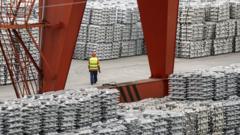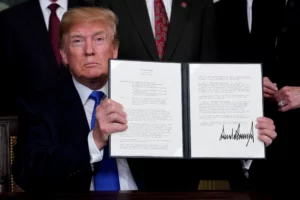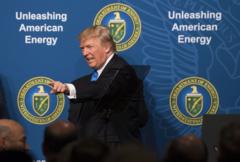Trump's recent proclamation to impose a 25% tariff on steel and aluminum imports has escalated tensions with global leaders, particularly in Canada and Europe, who have vowed to counter the measures. European Commission President Ursula von der Leyen has communicated the EU's commitment to "firm and proportionate countermeasures," reflecting the widespread concern that these tariffs could negatively impact a variety of industries linked to U.S. manufacturing.
Trump's Tariff Announcement Faces International Backlash

Trump's Tariff Announcement Faces International Backlash
U.S. President Donald Trump triggers strong reactions from allies in response to new steel and aluminum tariffs, set to reinforce trade barriers across North America and Europe.
The U.S. steel and aluminum tariffs, which are poised to take effect on March 12, mark an aggressive shift that cancels exemptions for traditional partners including Canada and the EU. Trump has framed the tariffs as a means to bolster domestic production, stating, "Our nation requires steel and aluminum to be made in America, not in foreign lands." The U.S. is the largest consumer of imported steel, with Canada, Brazil, and Mexico being the principal suppliers. Notably, Canada accounted for over half of U.S. aluminum imports in the previous year, prompting Canadian leaders to react swiftly and decisively to safeguard their economic interests.
Trudeau termed the tariffs as "totally unjustified," with calls from Canadian steelmaker lobbyists for immediate retaliation. Canadian officials have expressed apprehensions about preserving the historic trade partnership with the U.S. amidst these developments. Concerns extend to the economic ramifications within the U.S., where manufacturers, particularly in construction and goods production, may face increased costs.
In Europe, von der Leyen warned that "tariffs are taxes – bad for business, worse for consumers," signaling potential ramifications for trans-Atlantic trade if these tariffs remain as planned. Share prices in the U.S. steel sector experienced a rise, fueling speculation about Trump's strategy—whether it is a serious commitment or merely a negotiation ploy. Economists expressed doubts over the efficacy of such tariffs in generating domestic jobs, with past experiences under Trump's first term underscoring similar challenges faced by the industry.
Experts worry about the evolving landscape of international trade as the Trump administration pushes for stringent policies aimed at countries perceived to be infringing upon U.S. economic interests. The U.S. also recently introduced duties on imports from China, raising the stakes in ongoing global trade negotiations. If enforced, the current tariffs could lead to a significant reshaping of trade dynamics across North America and Europe. As the situation unfolds, industry players and policymakers are bracing for the potential consequences on the broader economy as they advocate for a balanced approach to international trade.
Trudeau termed the tariffs as "totally unjustified," with calls from Canadian steelmaker lobbyists for immediate retaliation. Canadian officials have expressed apprehensions about preserving the historic trade partnership with the U.S. amidst these developments. Concerns extend to the economic ramifications within the U.S., where manufacturers, particularly in construction and goods production, may face increased costs.
In Europe, von der Leyen warned that "tariffs are taxes – bad for business, worse for consumers," signaling potential ramifications for trans-Atlantic trade if these tariffs remain as planned. Share prices in the U.S. steel sector experienced a rise, fueling speculation about Trump's strategy—whether it is a serious commitment or merely a negotiation ploy. Economists expressed doubts over the efficacy of such tariffs in generating domestic jobs, with past experiences under Trump's first term underscoring similar challenges faced by the industry.
Experts worry about the evolving landscape of international trade as the Trump administration pushes for stringent policies aimed at countries perceived to be infringing upon U.S. economic interests. The U.S. also recently introduced duties on imports from China, raising the stakes in ongoing global trade negotiations. If enforced, the current tariffs could lead to a significant reshaping of trade dynamics across North America and Europe. As the situation unfolds, industry players and policymakers are bracing for the potential consequences on the broader economy as they advocate for a balanced approach to international trade.





















